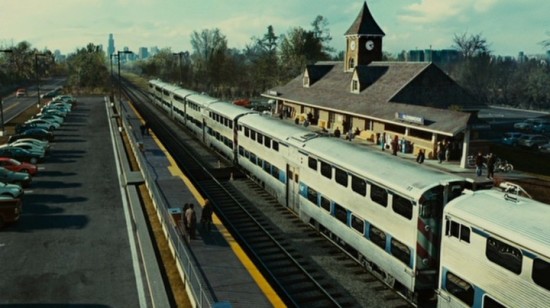Today the “spotlight” is on a new Liam Neeson thriller. But can Carson recover enough from yesterday’s script to enjoy it?
Genre: Thriller
Premise: A commuter gets a phone call informing him that if he doesn’t find a specific man on that train before the last stop, his wife and daughter will die.
About: I remember when this script hit the scene forever ago. Like a lot of scripts in Hollywood, it made some noise and then disappeared into the ether. What’s crazy about this town, though, is that if you don’t give up, if you keep improving and pushing the stuff you believe in, sooner or later, something good comes of it. And that’s exactly what happened here. The Commuter has caught the attention of one Liam Neeson, who’s just turned this into a Go picture. Writers Byron Willinger and Philip de Blasi have patiently waited 7 years, not securing a single credited writing assignment in TV or film in the meantime. And now, finally, their lives are about to change. Don’t you love this business?
Writer: Byron Willinger & Philip de Blasi
Details: 101 pages (3/28/08 draft)
In retrospect, could a script titled “The Commuter” have starred anyone other than Liam Neeson? It’d be like naming a script, “Quick Kill,” and expecting anyone other than Jean Clade Van Damme to be the lead. Neeson seems to be tailor-made for these one-word vague action-esque titles. But is the world getting sick of the “Neeson setup?”
I mean, in Non-Stop, Neeson gets a series of texts telling him he has to act or something terrible will happen. Here, he gets a series of calls telling him he has to act or something terrible will happen. Does that make this an unofficial sequel? Is part 3 that Neeson receives a series of tweets that he must act or something terrible will happen? “Liam, you must visit 100 websites before the end of the hour or death. #hurry.”
Truth be told I needed this script after yesterday’s monstrosity. I still don’t know why people are defending Spotlight like it’s some amazing script. There isn’t a single good moment in the script that isn’t purely due to the true story it’s based on. In other words, every good part is a part the writers had no choice but to include. As for everything else, stuff that needed to be writer-generated (like character exploration and character conflict) there was NOTHING. Ugh. I so needed some empty commutering to move past it. Please be good straight-forward Liam Neeson thriller. Please be good.
Michael Woolrich is a former cop famous for solving one of the city’s most notorious murders. But he’s moved past that life for reasons we’ll find out later. Now he works a calm office job, gets to spend a lot more time with his wife and daughter, and he’s happy. In fact, he’s going out to dinner with his wife tonight.
All he has to do is do what he does every evening. Get on the train and travel back from the city to the suburbs. Seems innocent enough. Well it ISN’T INNOCENT MOTHERF&^%ERS. Cause Liam Neeson is in this movie. And when Liam Neeson takes transportation somewhere, something always happens.
Indeed, Liam – I mean Michael – gets a call informing him that he needs to find someone named “Devlin” on the train before the train gets to its last stop. Apparently, there are two Feds at the last stop, waiting for Devlin to show up, because he witnessed a big murder. Once Michael finds Devlin, our phone-caller (and his mysterious crew, who are also on the train somewhere) can kill him to make sure he doesn’t tell the Feds what he knows.
Being the star detective that Michael is, this should be easy. The problem is that Devlin is an alias. And Devlin doesn’t WANT to be found. So this is going to be a little more challenging than your average investigation.
Throughout the 60 minute train ride, Michael will misidentify several Devlins, make some horrible mistakes, get booted off the train, and almost get his family killed several times. When he finally does figure out who Devlin is, mere minutes before the train reaches its destination, he will have to make the most difficult decision of his life. Should he kill Devlin himself to save his family?
The Commuter is bit like a game of monopoly. When someone mentions you should play, you hem and you haw and try to get out of it, but 45 minutes later, you’re excitedly rolling the dice, hoping you land on Boardwalk so you can take everyone’s money. This little script really does grow on you.
I think that’s because I had no fucking idea who Devlin was. Usually in these simplistic thriller “mysteries,” you know the killer before we’ve gotten out of the first act. But as Michael continues to bounce around well into the second act, you realize you don’t have the slightest clue who Devlin is.
If there’s a takeaway from this script, it’s that. If you’re going to write a simplistic thriller premise, then you better be WAY THE HELL AHEAD OF YOUR READER. Because if the reader gets ahead of you in a script like this, they’re going to be sooooo bored. There simply isn’t enough complexity in a plot like The Commuter’s to withstand a lot of other script issues.
I must admit, though, that I’m tired of the “random person calls and tells the protagonist he must obey” plot device. Starting all the way back with Die Hard 3, moving into Phone Booth, and more recently with, well, a dozen films over the last decade – there’s something lazy about it. It doesn’t take a whole lot of creativity to come up with the setup.
A man is on a Cruise Boat and gets a call that unless he commandeers the ship within the next 45 minutes, everyone on the ship will die.
See, I just did it.
Maybe it’s because the main character becomes a reactive pawn. They’re not pushing the movie forward. They’re following orders. I mean, how much more badass is John McClane in the original Die Hard as opposed to Die Hard 3 where he’s running around like a chicken with his head cut off, doing whatever this loser tells him to do? And that’s because when you’re following orders, you’re a reactive little bitch. It’s not hero-ish.
So again, if you’re going to go with this setup, you better be ready to execute. You better have a mystery that’s truly a mystery, and not just a “passing-the-time” Screenwriting 101 plot outline that any screenwriter could come up with.
Commuter shows off its metal when we finally find out who Devlin is. It forces our main character to make an IMPOSSIBLE choice. And that’s always good writing, when the writers put the main character in a situation where there is no right answer, where even the audience isn’t sure what they would do.
There were other nice touches here as well. In the B-storyline, which is the bad guys kidnapping Michael’s wife and daughter to motivate him, I liked how they didn’t already have the wife and daughter when they first made their threat. They were merely AFTER the wife and daughter.
So early in the script, we see the wife and daughter shopping, and then one of our bad guys watching them, planning how he’s going to kidnap them.
The reason this is such a smart move is because it adds uncertainty to the B-plotline. We’re still hoping that, against all hope, the wife and daughter might be able to escape. When you create uncertainty in a plotline, you get more mileage out of it. If, when the bad guys originally called Michael, they already had the wife and daughter in the basement, well, there isn’t a whole lot of uncertainty or hope in that storyline now is there? Its dramatic potential is at the end of the line. So yeah, I like how they gave us another exciting plotline to jump to.
And the script throws in a few nice surprise twists as well, specifically on the character front. One of my big beefs with Spotlight was that we knew NOTHING about the characters. They didn’t even try to make them real people, despite the fact that they were real people! And yet here, with Michael, a completely fictional person who’s never existed in the real world, we learn a HUGE revelation about his past that makes us rethink his entire character.
Do I think The Commuter is going to challenge Spotlight for an Oscar anytime soon? Of course not. People vote for movies like Spotlight because they’re important movies telling an important story. But if you’re looking to be entertained and thrilled, The Commuter will do the job.
[ ] what the hell did I just read?
[ ] wasn’t for me
[x] worth the read
[ ] impressive
[ ] genius
What I learned: Guys and gals, stop describing your characters with some variation of the description: “She looks worn down and tired, but you can still see her once-prominant beauty underneath.” “Tired/worn-down but still beautiful” is one of the most overused description-types I see. I guess it’s not the worst way to describe someone. Just know that it’s not exactly original.



